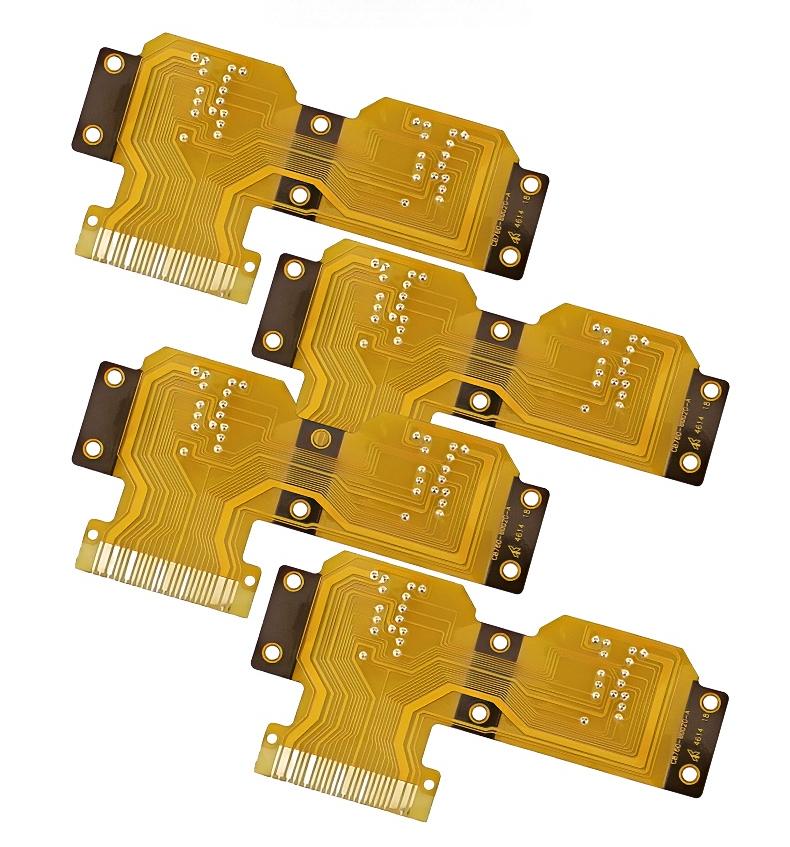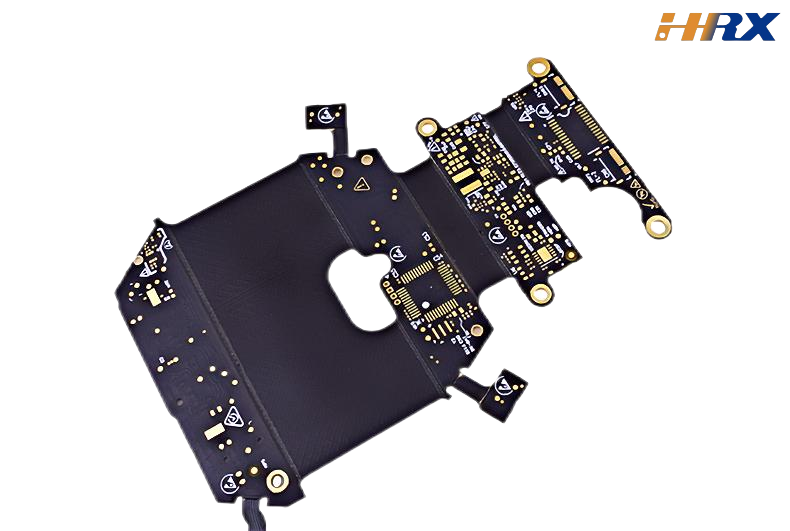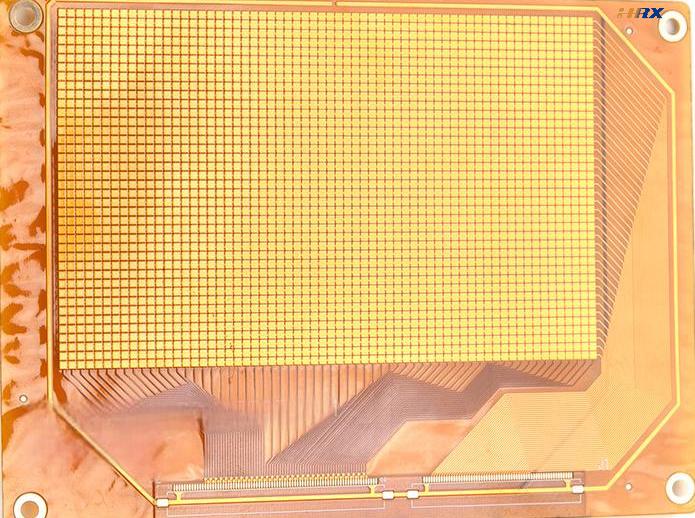HASL Lead - free + ENIG Combination in Rigid - flex Board Surface Treatment: Design, Production, Advantages, and Considerations
- Nov 19,2024
-
Share
In the production of rigid - flex boards, the combination of HASL (Hot - Air Solder Leveling) lead - free and electroless nickel - immersion gold (ENIG) as surface treatments offers unique possibilities. Shenzhen Huaruixin Electronics Co., Ltd., a professional FPC production and sales company, is here to share insights into the design and production of this combination, including common mistakes to avoid, its advantages, and how to make the right choice, along with successful design cases.

1. Cost - performance Optimization
The HASL lead - free process provides a relatively inexpensive way to cover a large area of the rigid - flex board with a solderable layer. It can handle general soldering requirements for components that are not extremely sensitive to surface finish. Then, by adding the ENIG process in specific areas, such as those with fine - pitch components or high - frequency signal transmission lines, we can achieve high - precision soldering and excellent contact performance. This combination allows for cost - effective production without sacrificing the performance of critical components.
2. Enhanced Solderability and Contact Reliability
HASL lead - free ensures good initial solderability for most components. When combined with ENIG, the gold layer in ENIG provides an outstandingly smooth and stable surface for soldering, especially for components with delicate leads. This results in reliable electrical connections and minimizes the risk of solder bridges and cold joints. For wire - bonding applications or connections that require frequent mating and unmating, the ENIG - treated areas offer superior performance.
3. Improved Corrosion Resistance
While HASL lead - free itself offers some level of protection against oxidation, the addition of ENIG significantly enhances the corrosion resistance of the rigid - flex board. The gold layer acts as an excellent barrier against environmental factors such as moisture, chemicals, and temperature variations. This makes the board more suitable for use in harsh environments, like industrial control systems, automotive electronics, and outdoor communication equipment.
4. Versatility in Design
This combination allows for greater flexibility in the design of rigid - flex boards. Designers can choose to apply HASL lead - free to areas where cost is a primary concern and ENIG to areas that demand high performance. This way, complex circuit designs with a mix of different component types and performance requirements can be easily accommodated.
1. Incompatible Process Sequencing
Mistake: Incorrectly determining the order of the HASL lead - free and ENIG processes can cause problems. For example, if the ENIG process is performed before HASL lead - free and there are issues with the cleaning between the two processes, residues from the ENIG chemicals can affect the quality of the HASL layer.
Impact: Poor adhesion between the layers, solderability issues, or contamination that can lead to electrical failures during operation.
Correct Approach: Carefully plan the process sequence and ensure thorough cleaning between each step. In most cases, HASL lead - free should be done first, followed by proper cleaning and then the ENIG process.
2. Ineffective Masking during ENIG Process
Mistake: When applying ENIG only to specific areas, improper masking can result in gold deposition in unwanted areas. This not only increases costs but can also cause short circuits if the gold layer bridges between conductive paths.
Impact: Increased production costs due to wasted gold and potential electrical failures in the final product.
Correct Approach: Use high - quality masking materials and precise masking techniques. Conduct regular inspections during the ENIG process to ensure that the gold is only deposited where intended.
3. Lack of Consideration for Compatibility between Layers
Mistake: Not taking into account the compatibility between the HASL lead - free layer and the ENIG layer can lead to problems. For example, if the materials or thicknesses are not properly selected, there may be issues with thermal expansion mismatch during temperature cycling, which can cause delamination or cracking.
Impact: Reduced reliability of the rigid - flex board, potential open circuits, or mechanical failures.
Correct Approach: Conduct compatibility tests during the design phase. Select appropriate materials and layer thicknesses based on the expected operating temperature range and other environmental factors.
4. Inaccurate Parameter Control in Both Processes
Mistake: In both the HASL lead - free and ENIG processes, parameters such as temperature, time, and chemical concentrations need to be precisely controlled. In HASL lead - free, incorrect temperature or air - flow rate can result in an uneven solder layer. In ENIG, improper nickel plating time or gold immersion conditions can lead to non - uniform or defective layers.
Impact: Poor surface quality, inconsistent solderability, and potential reliability issues.
Correct Approach: Use advanced process control equipment and regularly calibrate the instruments. Conduct sample tests during production to ensure that the parameters are within the optimal range.
1. Based on Component Requirements
For rigid - flex boards with a mix of components, analyze the sensitivity of each component to the surface finish. Components with fine - pitch leads, high - frequency characteristics, or those used in critical signal paths should be in areas treated with ENIG. Components with less stringent requirements can be on the HASL lead - free - treated areas. For example, in a communication device's rigid - flex board, the RF (Radio Frequency) module connectors might require ENIG, while the power supply connections can be handled by HASL lead - free.
2. Considering the Operating Environment
If the rigid - flex board will be used in a harsh environment with high humidity, temperature variations, or exposure to chemicals, prioritize ENIG in areas that are more vulnerable to corrosion. However, if the environment is relatively benign, a larger portion of the board can be HASL lead - free - treated to reduce costs. In automotive electronics, areas near the engine where there is higher heat and potential exposure to oil and other chemicals should have ENIG, while interior lighting control circuits might be suitable for HASL lead - free.
3. Cost - benefit Analysis
Evaluate the overall cost of production against the performance requirements. If the budget is tight and the application can tolerate slightly lower performance in some areas, increase the use of HASL lead - free. But if the reliability and performance of the product are of utmost importance, invest in more ENIG - treated areas. In consumer electronics, for low - cost products like basic feature phones, more HASL lead - free can be used. In contrast, high - end smartphones with complex functionality and higher performance expectations would have a significant portion of the board with ENIG in key areas.
1. Industrial Control Rigid - flex BoardAt
Shenzhen Hauruixin Electronics, we designed an industrial control rigid - flex board using the HASL lead - free + ENIG combination. The board had a mix of components, including microcontrollers, power modules, and various sensors. We applied HASL lead - free to the power supply and less critical signal paths areas to reduce costs. For the microcontroller pins and sensor interfaces, which required high - precision soldering and reliable connections, we used ENIG. By carefully controlling the process sequence, masking, and process parameters, we achieved a high - quality surface treatment. The resulting board has been operating stably in the industrial environment, handling temperature variations and potential chemical exposure without any issues.
2. Smartphone Motherboard - like Rigid - flex Board
In a project similar to a smartphone motherboard design, we combined HASL lead - free and ENIG. The HASL lead - free was used for areas related to general power distribution and some non - critical signal lines. ENIG was applied to the areas around the CPU, memory chips, and high - speed data transmission lines. Through precise masking and parameter control, we ensured that the ENIG - treated areas provided excellent soldering and contact performance. The HASL lead - free areas also had good solderability for the remaining components. The final rigid - flex board contributed to the overall high - performance operation of the smartphone - like device.
In conclusion, the HASL lead - free + ENIG combination in rigid - flex board surface treatment offers many advantages but requires careful design and production considerations. At
Shenzhen Hauruixin Electronics Co., Ltd., we are dedicated to providing high - quality FPC solutions. We welcome new and old customers to communicate and exchange ideas with us to make the best use of this surface treatment combination.


 Huaruixin Electronics mainly produces printed circuit boards as the core business, to provide customers with one-stop solutions for FPC/PCB production, components sourcing and Assembly.
Huaruixin Electronics mainly produces printed circuit boards as the core business, to provide customers with one-stop solutions for FPC/PCB production, components sourcing and Assembly.

